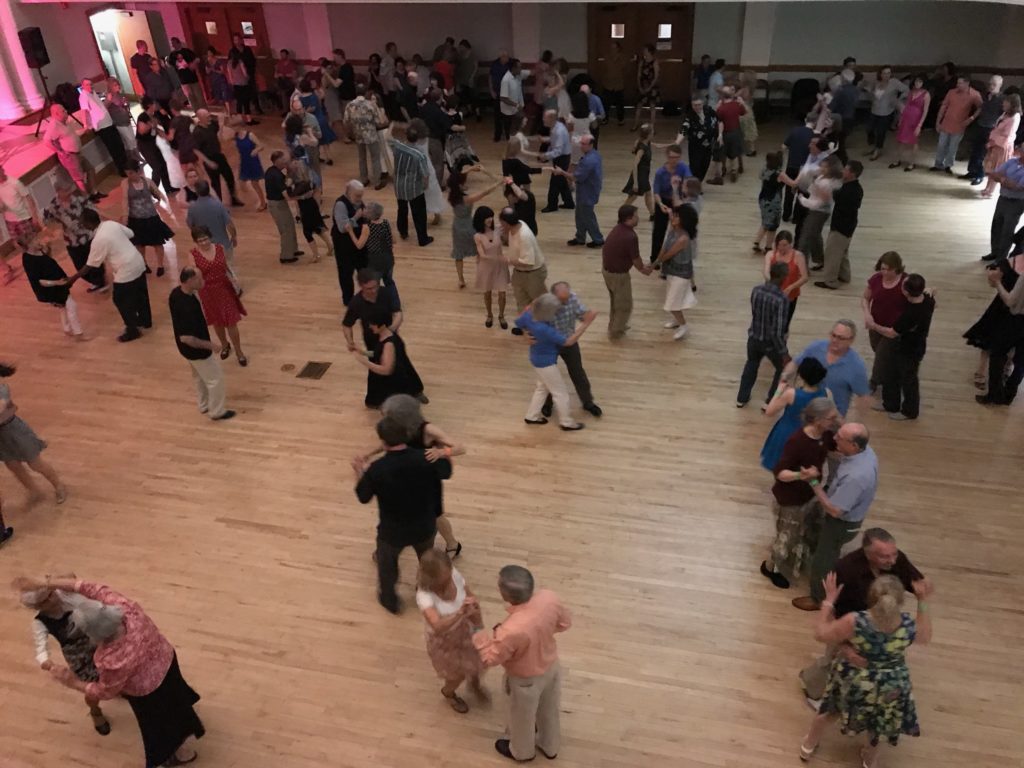
When I’m not being a writer and a therapist, I go dancing. Well, not all the time…but a lot. In particular, I go swing dancing. It’s a blast, it’s great exercise, and it’s taught me more about being part of a couple.
The culture in social swing dance is that everyone dances with everyone, regardless of age, marital status, etc. (Some people chose to dance only with their S.O., but mostly we mix it up.) It’s about only a three-minute dance, nothing beyond that. So everyone gets to dance with a variety of partners. Each one has a different style, which is part of what makes it fun—and informative.
Here are some things I’ve learned:
Within a structure, you have a lot of flexibility. Swing is a partner dance, where one person (usually the guy) leads, and one person (usually the woman) follows. The lead is responsible for suggesting what the follow does (turn right, turn left, move closer or apart, etc.) and the follow is responsible for paying attention to those suggestions and following them.
If this sounds rigid and boring, it’s not. There’s a surprisingly amount of wiggle room within the basic structure for being playful and for building off each other. The variations are endless—just like romantic partnerships. Keeping on the beat and using the standard swing moves, you can do whatever works for the two of you. Same in life. Even in a committed relationship, couples can figure out what unique arrangement works best for them.
The better you communicate, the better it goes. Couple dance is all about communication. Being vague, bossy, or unresponsive can lead to awkward, less-fun dances. When leads are clear and follows are attentive, the whole dance just flows.
I don’t have to be in charge of everything. I tend to be one of those people who plans and organizes. (Yes, sisters and cousins, I see you smiling….) So when I started swing dancing and an instructor said my job as a follow was to “turn off my mind” (!) and not anticipate the next move, I balked.
At first. Then I decided I should get with the program and try—and found it an awesome change of pace. I tune into what my partner is trying to communicate, attending to the signals of his body rather than whatever else is in my mind. It’s very focused and relaxing. It’s lovely to be able to trust that if I concentrate on doing my part, someone else will do theirs. Letting go of the need to make some decisions leads to a more balanced relationship and more time to enjoy the tasks you do take on.
Attitude is everything. It’s more fun to dance with someone less skilled but smiling than with a talented person who’s a sourpuss. It’s also more pleasant to be in a relationship with someone with a cheerful outlook than someone who’s constantly grumpy.
When something goes wrong, don’t blame; just make the best of it. Even good dancers miss signals or get out of step. If you look for flaws and negatives, you’ll always find them. Being hard on your partner, or on yourself, only gets in the way. When stuff happens, smile, and move on.
Not all partners will keep you safe. Leaders are supposed to make sure the moves they initiate won’t crash the follow into other people. Most leads take this seriously, but a few don’t. They’re so busy showing off or gazing at the follower or whatever that they don’t prevent collisions. People who don’t care about your wellbeing are partners to avoid—in life as well as in dance.
The showier partners may not be the best ones. Some people may look fancy when you watch them from across the room, but are awful to actually dance with. They may crank the follow’s arm rather than gently suggesting a turn—which can result in injuries. They may be so rough that they throw her off balance. The good partners may or may not have cool moves, but they definitely treat their partner with respect and care. That’s what you want in life as well.
Focus less on what you look like and more on your personal experience. I’ve heard dancers complain about partners who are so busy scanning the room to see who’s watching that they aren’t paying attention to the dance. Other people are afraid to dance because they don’t think they’ll look good. In dance as in your love life, it matters much less what you look like to outsiders and much more how you treat each other. Be considerate and connected with a dance partner for the three minutes you’re dancing; stay kind and connected with your life partner forever.
It’s fun to use your body. Well, I already knew that…but know it differently now that I’m a dancer. It’s important to not stay stuck in your head. Enjoy the dance and the ways your body moves. With your lover, keep in the physical in your life: stay affectionate and make love. Go for walks; find physical activities you both like. And maybe dance in the kitchen or on a dance floor.